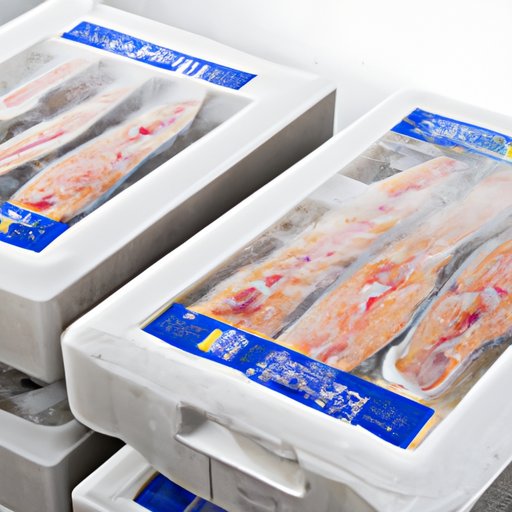Introduction: What is Salmon and Why Should You Freeze It?
Salmon is a type of fish that is rich in minerals, vitamins, and healthy fats. It is an important source of omega-3 fatty acids and is often recommended as part of a balanced diet. Salmon has a mild flavor that makes it suitable for a variety of dishes, from salads to stews. It is also a popular choice for grilling and baking.
Freezing salmon is a great way to preserve it for a longer period of time. Freezing will help to retain the texture and flavor of the fish, and prevent it from spoiling. It can also be convenient for meal planning, since you can take out only the amount of salmon you need and leave the rest in the freezer.
How Long Does Salmon Last in the Freezer?
The shelf life of frozen salmon depends on several factors, including the quality of the fish, the temperature of the freezer, and the packaging used. Generally, frozen salmon can last for up to 6 months. If stored properly, it may last even longer.

Factors That Affect Shelf Life
The shelf life of frozen salmon is affected by several factors, including the quality of the fish, the temperature of the freezer, and the packaging used. The quality of the fish is important because fresh salmon will not last as long as frozen salmon. Additionally, if the fish is already old when it is frozen, it will not last as long as a fresh salmon that was frozen immediately after being caught.
The temperature of the freezer also affects the shelf life of frozen salmon. To maximize the shelf life, it should be stored at 0°F (-18°C). Any higher temperatures will cause the salmon to spoil faster. Additionally, the packaging used should be airtight and moisture-proof to prevent freezer burn.

How to Tell if Salmon Is Still Good
To tell if frozen salmon is still good, look for any changes in color or texture. If the salmon has a grayish hue or is discolored, it has likely gone bad and should be discarded. Additionally, if the salmon has an unpleasant odor or slimy texture, it should not be eaten.
Maximizing the Shelf Life of Frozen Salmon
To maximize the shelf life of frozen salmon, it is important to follow certain guidelines. These include controlling the temperature of the freezer, using proper packaging, and labeling the food with the date it was frozen.
Temperature Control
The temperature of the freezer plays an important role in preserving the quality of frozen salmon. To ensure the salmon stays fresh, the temperature of the freezer should be set to 0°F (-18°C). Any higher temperatures will cause the salmon to spoil faster.
Proper Packaging
To prevent freezer burn, it is important to use airtight and moisture-proof packaging. This could include freezer bags, plastic containers, or vacuum-sealed packages. When using plastic containers, make sure to leave some headspace to allow for expansion.
Date Labeling
It is important to label the food with the date it was frozen. This will help you keep track of how long the salmon has been in the freezer and allows you to discard any food that has been stored for too long.

Tips for Storing Salmon in the Freezer
There are several tips that can help you get the most out of your frozen salmon. These include separating different cuts of salmon, vacuum sealing, and using ice cube trays.
Separate Different Cuts
If you plan on freezing multiple cuts of salmon, it is best to separate them. This will help to prevent cross-contamination and ensure the salmon stays fresh for longer.
Vacuum Seal
Vacuum sealing is a great way to preserve the quality of the salmon. Vacuum sealing will prevent freezer burn and help to retain the flavor and texture of the fish.
Consider Using Ice Cube Trays
Ice cube trays are a great way to store small amounts of salmon. Simply fill each compartment with the desired amount of salmon and freeze. Once frozen, the cubes can be transferred to an air-tight container and stored in the freezer.
What is the Best Way to Freeze Salmon?
When freezing salmon, there are two methods you can use: the quick freeze method and the slow freeze method. The quick freeze method involves freezing the salmon quickly by submerging it in cold water or putting it in the freezer. The slow freeze method involves slowly freezing the salmon over a period of time. Both methods can be effective, but the slow freeze method tends to produce better results.

How to Keep Salmon Fresh in the Freezer
To keep frozen salmon fresh for as long as possible, it is important to maintain a low temperature, use an air-tight container, and rotate stock. Additionally, it is important to check the expiration date of the salmon. If it has passed, the salmon should be discarded.
Conclusion: Summary of Storing Salmon in the Freezer
Storing salmon in the freezer is a great way to extend its shelf life and retain its flavor and texture. To maximize the shelf life of frozen salmon, it is important to control the temperature of the freezer, use proper packaging, and label the food with the date it was frozen. Additionally, it is important to use an air-tight container, rotate stock, and maintain a low temperature. By following these guidelines, you can ensure that your frozen salmon stays fresh for as long as possible.
Finally, when selecting a method for freezing salmon, it is best to use the slow freeze method. This will help to preserve the quality of the fish and ensure that it retains its flavor and texture.


